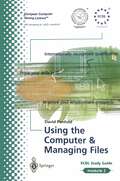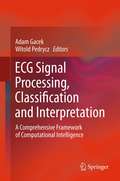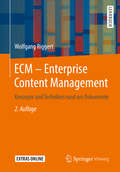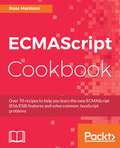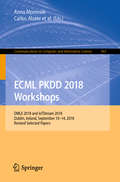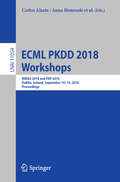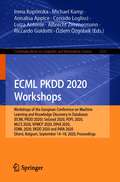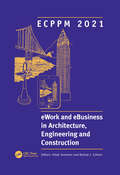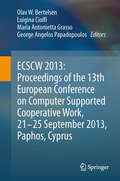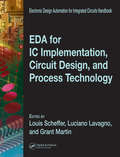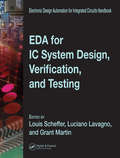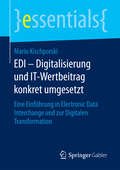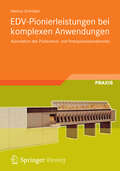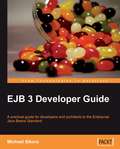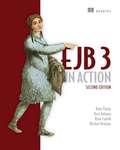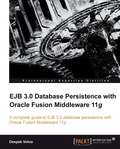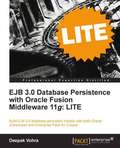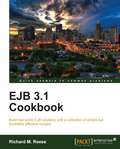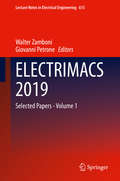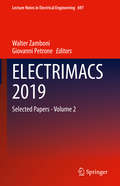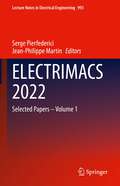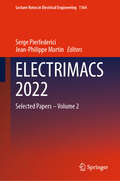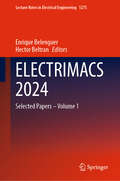- Table View
- List View
ECDL Module 2: ECDL - the European PC standard (European Computer Driving Licence #2)
by David Penfold••••••••• Preface This book is intended to help you successfully complete the test for Module 2 of the European Computer Driving Licence (ECDL). However before we start working through the actual content of the guide you may find it useful to know a little bit more about the ECDL in general and where this particular Module fits into the overall framework. What Is The ECDL? The European Computer Driving Licence (ECDL) is a European-wide qualification that enables people to demonstrate their competence in computer skills. It certifies the candidate's knowledge and competence in personal computer usage at a basic level and is based upon a single agreed syllabus. This syllabus covers a range of specific knowledge areas and skill sets, which are broken down into seven modules. Each of the modules must be passed before the ECDL certificate can be awarded, though they may be taken in any order but must be completed within a three year period. Testing of candidates is at audited testing centres, and successful completion of the test will demonstrate the holder's basic knowledge and competence in using a personal computer and common computer applications. The implementation of the ECDL in the UK is being managed by the British Computer Society. It is growing at a tremendous rate and is set to become the most widely recognised qualification in the field of work-related computer use.
ECG Signal Processing, Classification and Interpretation
by Adam Gacek Witold PedryczThe book shows how the various paradigms of computational intelligence, employed either singly or in combination, can produce an effective structure for obtaining often vital information from ECG signals. The text is self-contained, addressing concepts, methodology, algorithms, and case studies and applications, providing the reader with the necessary background augmented with step-by-step explanation of the more advanced concepts. It is structured in three parts: Part I covers the fundamental ideas of computational intelligence together with the relevant principles of data acquisition, morphology and use in diagnosis; Part II deals with techniques and models of computational intelligence that are suitable for signal processing; and Part III details ECG system-diagnostic interpretation and knowledge acquisition architectures. Illustrative material includes: brief numerical experiments; detailed schemes, exercises and more advanced problems.
ECM – Enterprise Content Management: Konzepte und Techniken rund um Dokumente
by Wolfgang RiggertLeistungsfähige, innovative IT-Systeme sind heute für Unternehmen unverzichtbarer Ausdruck ihrer Wettbewerbsfähigkeit. Dem Umgang mit Dokumenten kommt in diesem Kontext zentrale Bedeutung zu. Neuartige Konzepte und Technologien ermöglichen ein hohes Rationalisierungspotenzial. ECM ist ein neues Schlagwort rund um Dokumente. Was verbirgt sich hinter diesem Kürzel? Dieses Buch beleuchtet Idee, Grundlagen und Umsetzung. Ein Werk zum Orientieren, Lernen und Nachschlagen für Studenten und Praktiker gleichermaßen.
ECMAScript Cookbook: Over 70 recipes to help you learn the new ECMAScript (ES6/ES8) features and solve common JavaScript problems
by Ross HarrisonBecome a better web programmer by writing efficient and modular code using ES6 and ES8Key FeaturesLearn to write asynchronous code and improve the readability of your web applications Explore advanced concepts such as closures, Proxy, generators, Promise, async functions, and Atomics Use different design patterns to create structures to solve common organizational and processing issuesBook DescriptionECMAScript Cookbook follows a modular approach with independent recipes covering different feature sets and specifications of ECMAScript to help you become an efficient programmer.This book starts off with organizing your JavaScript applications as well as delivering those applications to modem and legacy systems. You will get acquainted with features of ECMAScript 8 such as async, SharedArrayBuffers, and Atomic operations that enhance asynchronous and parallel operations. In addition to this, this book will introduce you to SharedArrayBuffers, which allow web workers to share data directly, and Atomic operations, which help coordinate behavior across the threads. You will also work with OOP and Collections, followed by new functions and methods on the built-in Object and Array types that make common operations more manageable and less error-prone. You will then see how to easily build more sophisticated and expressive program structures with classes and inheritance. In the end, we will cover Sets, Maps, and Symbols, which are the new types introduced in ECMAScript 6 to add new behaviors and allow you to create simple and powerful modules.By the end of the book, you will be able to produce more efficient, expressive, and simpler programs using the new features of ECMAScript. What you will learnOrganize JavaScript programs across multiple files, using ES modulesCreate and work with promises using the Promise object and methodsCompose async functions to propagate and handle errorsSolve organizational and processing issues with structures using design patternsUse classes to encapsulate and share behaviorOrchestrate parallel programs using WebWorkers, SharedMemory, and AtomicsUse and extend Map, Set, and Symbol to work with user-defined classes and simulate data typesExplore new array methods to avoid looping with arrays and other collectionsWho this book is forIf you’re a web developer with a basic understanding of JavaScript and wish to learn the latest features of ECMAScript for developing efficient web applications, this book is for you.
ECML PKDD 2018 Workshops: DMLE 2018 and IoTStream 2018, Dublin, Ireland, September 10-14, 2018, Revised Selected Papers (Communications in Computer and Information Science #967)
by Moamar Sayed-Mouchaweh João Gama Anna Monreale Carlos Alzate Albert Bifet Michael Kamp Yamuna Krishnamurthy Daniel Paurat Rita P. RibeiroThis book constitutes revised selected papers from the workshops DMLE and IoTStream, held at the 18thEuropean Conference on Machine Learning and Knowledge Discovery in Databases, ECML PKDD 2018, in Dublin, Ireland, in September 2018. The 8 full papers presented in this volume were carefully reviewed and selected from a total of 12 submissions.The workshops included are:DMLE 2018: First Workshop on Decentralized Machine Learning at the EdgeIoTStream 2018: 3rd Workshop on IoT Large Scale Machine Learning from Data Streams
ECML PKDD 2018 Workshops: MIDAS 2018 and PAP 2018, Dublin, Ireland, September 10-14, 2018, Proceedings (Lecture Notes in Computer Science #11054)
by Guido Caldarelli Tiziano Squartini Riccardo Guidotti Anna Monreale Carlos Alzate Livio Bioglio Valerio Bitetta Ilaria Bordino Andrea Ferretti Francesco Gullo Stefano Pascolutti Ruggero G. Pensa Celine RobardetThis book constitutes revised selected papers from two workshops held at the 18th European Conference on Machine Learning and Knowledge Discovery in Databases, ECML PKDD 2018, in Dublin, Ireland, in September 2018, namely: MIDAS 2018 – Third Workshop on Mining Data for Financial Applications andPAP 2018 – Second International Workshop on Personal Analytics and Privacy. The 12 papers presented in this volume were carefully reviewed and selected from a total of 17 submissions.
ECML PKDD 2020 Workshops: Workshops of the European Conference on Machine Learning and Knowledge Discovery in Databases (ECML PKDD 2020): SoGood 2020, PDFL 2020, MLCS 2020, NFMCP 2020, DINA 2020, EDML 2020, XKDD 2020 and INRA 2020, Ghent, Belgium, September 14–18, 2020, Proceedings (Communications in Computer and Information Science #1323)
by Peter Christen Annalisa Appice Donato Malerba Michelangelo Ceci Corrado Loglisci Giuseppe Manco Elio Masciari Zbigniew W. Ras Erich Schubert João Gama Riccardo Guidotti Anna Monreale Pedro M. Ferreira Ricard Gavaldà Michael Kamp Yamuna Krishnamurthy Rita P. Ribeiro Albrecht Zimmermann Jon Atle Gulla Arthur Zimek Przemyslaw Biecek Irena Koprinska Luiza Antonie Özlem Özgöbek Linara Adilova Ibéria Medeiros Eirini Ntoutsi Salvatore Rinzivillo Benjamin Kille Andreas LommatzschThis volume constitutes the refereed proceedings of the workshops which complemented the 20th Joint European Conference on Machine Learning and Knowledge Discovery in Databases, ECML PKDD, held in September 2020. Due to the COVID-19 pandemic the conference and workshops were held online. The 43 papers presented in volume were carefully reviewed and selected from numerous submissions. The volume presents the papers that have been accepted for the following workshops: 5th Workshop on Data Science for Social Good, SoGood 2020; Workshop on Parallel, Distributed and Federated Learning, PDFL 2020; Second Workshop on Machine Learning for Cybersecurity, MLCS 2020, 9th International Workshop on New Frontiers in Mining Complex Patterns, NFMCP 2020, Workshop on Data Integration and Applications, DINA 2020, Second Workshop on Evaluation and Experimental Design in Data Mining and Machine Learning, EDML 2020, Second International Workshop on eXplainable Knowledge Discovery in Data Mining, XKDD 2020; 8th International Workshop on News Recommendation and Analytics, INRA 2020. The papers from INRA 2020 are published open access and licensed under the terms of the Creative Commons Attribution 4.0 International License.
ECPPM 2021 - eWork and eBusiness in Architecture, Engineering and Construction: Proceedings of the 13th European Conference on Product & Process Modelling (ECPPM 2021), 5-7 May 2021, Moscow, Russia
by Vitaly SemenoveWork and eBusiness in Architecture, Engineering and Construction 2021 collects the papers presented at the 13th European Conference on Product and Process Modelling (ECPPM 2021, Moscow, 5-7 May 2021). The contributions cover a wide spectrum of thematic areas that hold great promise towards the advancement of research and technological development targeted at the digitalization of the AEC/FM (Architecture, Engineering, Construction and Facilities Management) domains. High quality contributions are devoted to critically important problems that arise, including: Information and Knowledge Management Semantic Web and Linked Data Communication and Collaboration Technologies Software Interoperability BIM Servers and Product Lifecycle Management Systems Digital Twins and Cyber-Physical Systems Sensors and Internet of Things Big Data Artificial and Augmented Intelligence in AEC Construction Management 5D/nD Modelling and Planning Building Performance Simulation Contract, Cost and Risk Management Safety and Quality Sustainable Buildings and Urban Environments Smart Buildings and Cities BIM Standardization, Implementation and Adoption Regulatory and Legal Aspects BIM Education and Training Industrialized Production, Smart Products and Services Over the past quarter century, the biennial ECPPM conference series, as the oldest BIM conference, has provided researchers and practitioners with a unique platform to present and discuss the latest developments regarding emerging BIM technologies and complementary issues for their adoption in the AEC/FM industry.
ECSCW 2013: Proceedings of the 13th European Conference on Computer Supported Cooperative Work, 21-25 September 2013, Paphos, Cyprus
by George Angelos Papadopoulos Maria Antonietta Grasso Luigina Ciolfi Olav W. BertelsenThis volume presents the proceedings of ECSCW 2013, the 13th European Conference on Computer Supported Cooperative Work. Each conference offers an occasion to critically review our research field, which has been multidisciplinary and committed to high scientific standards, both theoretical and methodological, from its beginning. The papers this year focus on work and the enterprise as well as on the challenges of involving citizens, patients, etc. into collaborative settings. The papers embrace new theories, and discuss known ones. They contribute to the discussions on the blurring boundaries between home and work and on the ways we think about and study work. They introduce recent and emergent technologies, and study known social and collaborative technologies. With contributions from all over the world, the papers in interesting ways help focus on the European perspective in our community. The 15 papers selected for this conference deal with and reflect the lively debate currently ongoing in our field of research.
EDA for IC Implementation, Circuit Design, and Process Technology (Electronic Design Automation for Integrated Circuits Hdbk)
by Grant Martin Luciano Lavagno Louis SchefferPresenting a comprehensive overview of the design automation algorithms, tools, and methodologies used to design integrated circuits, the Electronic Design Automation for Integrated Circuits Handbook is available in two volumes. The second volume, EDA for IC Implementation, Circuit Design, and Process Technology, thoroughly examines real-time logic to GDSII (a file format used to transfer data of semiconductor physical layout), analog/mixed signal design, physical verification, and technology CAD (TCAD). Chapters contributed by leading experts authoritatively discuss design for manufacturability at the nanoscale, power supply network design and analysis, design modeling, and much more. Save on the complete set.
EDA for IC System Design, Verification, and Testing (Electronic Design Automation for Integrated Circuits Hdbk)
by Louis Scheffer, Luciano Lavagno and Grant MartinPresenting a comprehensive overview of the design automation algorithms, tools, and methodologies used to design integrated circuits, the Electronic Design Automation for Integrated Circuits Handbook is available in two volumes. The first volume, EDA for IC System Design, Verification, and Testing, thoroughly examines system-level design, microarchitectural design, logical verification, and testing. Chapters contributed by leading experts authoritatively discuss processor modeling and design tools, using performance metrics to select microprocessor cores for IC designs, design and verification languages, digital simulation, hardware acceleration and emulation, and much more. Save on the complete set.
EDI – Digitalisierung und IT-Wertbeitrag konkret umgesetzt: Eine Einführung in Electronic Data Interchange und zur Digitalen Transformation (essentials)
by Mario KischporskiMario Kischporski untersucht in diesem essential das Thema Electronic Data Interchange (EDI) im Hinblick auf Chancen und Herausforderungen des praktischen Einsatzes im t#65533;glichen Gesch#65533;ftsleben. Dabei werden v. a. die Bedeutung des Strukturdatenaustausches, Fallstricke und praxisrelevante Betrachtungen herausgearbeitet und #65533;bersichtlich, kompakt und nachvollziehbar dargestellt. Dies soll dem Leser helfen, einen fundierten #65533;berblick zu erlangen und die Potentiale der Digitalisierung konkret und pragmatisch in der Anwendungspraxis im Alltag anzuwenden und zu nutzen. Zum Thema EDI gibt es so gut wie keine (einf#65533;hrende) Fachliteratur. Diese L#65533;cke soll dieses essential schlie#65533;en.
EDV-Pionierleistungen bei komplexen Anwendungen
by Helmut SchröderDas Buch möchte die Leser in die Frühzeit der elektronischen Datenverarbeitung (EDV), nämlich die 50er, 60er und 70er Jahre des vorigen Jahrhunderts führen, an die sich heute noch sehr viele ehemalige EDV-Mitarbeiter "als Pioniere" gut und wohl auch gern erinnern werden. Wie kann man diese Zeitphase bezeichnen? Es war eine einmalige innovative Phase, durch gravierende technische Neuerungen wurde eine enorme Aufbruchstimmung ausgelöst. Für das Projekt "Automatisierung des Postscheck- und Postsparkassendienstes" werden die komplexen Entwicklungen dargestellt. Es war seinerzeit das EDV-Projekt mit dem größten Geschäftspotential eines einzelnen Kunden in Deutschland. Die elektronischen Datenverarbeitung (EDV) wurde zunächst geprägt von Großrechnern, die mathematische Aufgaben für Großforschungsinstitute und Universitäten als "Rechenknechte" lösten. Kommerzielle Anwendungn wurden durch zu langsame Ein-/Ausgabeeinheiten verhindert. Der Postminister Richard Stücklen entwickelte die Idee, eine automatisierte Lösung auch für seinen Postscheck- und Postsparkassendienst zu nutzen. Das Buch beschreibt die Erkundungsphase, das Umdenken von der Lochkarte zur Belegverarbeitung sowie die allgemeine Situation der Ausbildung und dem Bau von Rechenzentren. Aus der Entwicklungsphase bis ca. 1972 werden die Anwendungslösungen und Systemlösungen dargestellt und kommentiert. Pionierleistungen waren vor allem die zügige Automation des Postsparkassendienstes, die erste europaweite Kontenführung mit Belegverarbeitung im Postscheckdienst und der einzige Belegleser-Massentest mit Magnetschriften in Deutschland.
EFF's Guide to the Internet, v. 3.15
by Adam GaffinWelcome to the Internet! You're about to start a journey through a unique land without frontiers, a place that is everywhere at once -- even though it exists physically only as a series of electrical impulses. You'll be joining a growing community of millions of people around the world who use this global resource on a daily basis.<P> With this book, you will be able to use the Internet to:<P> * Stay in touch with friends, relatives and colleagues around the world, at a fraction of the cost of phone calls or even air mail.<P> * Discuss everything from archaeology to zoology with people in several different languages.<P> * Tap into thousands of information databases and libraries worldwide.<P> * Retrieve any of thousands of documents, journals, books and computer programs.<P> * Stay up to date with wire-service news and sports and with official weather reports.<P> * Play live, "real time" games with dozens of other people at once.
EJB 3 Developer Guide
by Michael SikoraThis book is a fast-paced tutorial that explores the key features of EJB 3 with many accompanying examples. This book is not a complete reference guide, but a concise exploration of EJB 3's core elements. This book is primarily aimed at professional developers who already have a working knowledge of Java. Enterprise architects and designers with a background in Java would also find this book of use. Previous experience of working with Java is essential and knowledge of relational databases is desirable. As this book is an introduction to EJB 3, it is aimed at those who are new to EJB 3. As the new version of EJB is so radically different from the previous version (EJB 2.x), the book is suitable for and should be of interest to those who have had experience working with EJB 2.x. The text makes it clear where the differences between the versions of EJB lie, although they are not explored in detail.
EJB 3 in Action
by Debu Panda Reza Rahman Michael Remijan Ryan CuprakSummaryBuilding on the bestselling first edition, EJB 3 in Action, Second Edition tackles EJB 3.2 head-on, through numerous code samples, real-life scenarios, and illustrations. This book is a fast-paced tutorial for Java EE 6 business component development using EJB 3.2, JPA 2, and CDI. Besides covering the basics of EJB 3.2, this book includes in-depth EJB 3.2 internal implementation details, best practices, design patterns, and performance tuning tips.Purchase of the print book includes a free eBook in PDF, Kindle, and ePub formats from Manning Publications.About the BookThe EJB 3 framework provides a standard way to capture business logic in manageable server-side modules, making it easier to write, maintain, and extend Java EE applications. EJB 3.2 provides more enhancements and intelligent defaults and integrates more fully with other Java technologies, such as CDI, to make development even easier.EJB 3 in Action, Second Edition is a fast-paced tutorial for Java EE business component developers using EJB 3.2, JPA, and CDI. It tackles EJB head-on through numerous code samples, real-life scenarios, and illustrations. Beyond the basics, this book includes internal implementation details, best practices, design patterns, performance tuning tips, and various means of access including Web Services, REST Services, and WebSockets.Readers need to know Java. No prior experience with EJB or Java EE is assumed.What's InsideFully revised for EJB 3.2POJO persistence with JPA 2.1Dependency injection and bean management with CDI 1.1Interactive application with WebSocket 1.0About the AuthorsDebu Panda, Reza Rahman, Ryan Cuprak, and Michael Remijan are seasoned Java architects, developers, authors, and community leaders. Debu and Reza coauthored the first edition of EJB 3 in Action.Table of ContentsPART 1 OVERVIEW OF THE EJB LANDSCAPEWhat's what in EJB 3A first taste of EJBPART 2 WORKING WITH EJB COMPONENTSBuilding business logic with session beansMessaging and developing MDBsEJB runtime context, dependency injection,and crosscutting logic Transactions and securityScheduling and timersExposing EJBs as web servicesPART 3 USING EJB WITH JPA AND CDIJPA entitiesManaging entitiesJPQLUsing CDI with EJB 3PART 4 PUTTING EJB INTO ACTIONPackaging EJB 3 applicationsUsing WebSockets with EJB 3Testing and EJB
EJB 3.0 Database Persistence with Oracle Fusion Middleware 11g
by Deepak VohraThis is a practical, tutorial-style book that includes many examples that demonstrate how to develop EJB 3.0 database persistence applications with Oracle Fusion Middleware 11g. Every chapter starts with setting the environment for the chapter and includes an example application illustrated with figures at milestone stages. This book is aimed at EJB 3.0 application developers who want to learn about the practical use of EJB 3.0 database persistence with Oracle Fusion Middleware. Those who are already using EJB 3.0 database persistence will learn about using EJB 3.0 database persistence with Oracle Fusion Middleware 11g. The target audience is expected to have some prior knowledge about Java EE, EJBs, EJB 3.0, JSF, AJAX, web services, and XML. This book is ideal for those developers who have working knowledge of JDeveloper and WebLogic server, and wish to learn about the practical use of EJB 3.0 with Oracle Fusion Middleware.
EJB 3.0 Database Persistence with Oracle Fusion Middleware 11g: LITE
by Deepak VohraThe book is a tutorial that goes from basic to professional level for Agile IT security. It begins by assuming little knowledge of agile security. Readers should hold a good knowledge of security methods and agile development.The book is targeted at IT security managers, directors, and architects. It is useful for anyone responsible for the deployment of IT security countermeasures. Security people with a strong knowledge of agile software development will find this book to be a good review of agile concepts.
EJB 3.1 Cookbook
by Richard M. ReeseEach recipe comprises step-by-step instructions followed by an analysis of what was done in each task and other useful information. The book is designed so that you can read it chapter by chapter, or look at the list of recipes and refer to them in no particular order. It is packed with useful screenshots to make your learning even easier.The book is aimed at Java EE and EJB developers and programmers. Readers should be familiar with the use of servlets in the construction of a web application. A working knowledge of XML is also desirable.
ELECTRIMACS 2019: Selected Papers - Volume 1 (Lecture Notes in Electrical Engineering #604)
by Giovanni Petrone Walter ZamboniThis book collects a selection of papers presented at ELECTRIMACS 2019, the 13th international conference of the IMACS TC1 Committee, held in Salerno, Italy, on 21st-23rd May 2019. The conference papers deal with modelling, simulation, analysis, control, power management, design optimization, identification and diagnostics in electrical power engineering. The main application fields include electric machines and electromagnetic devices, power electronics, transportation systems, smart grids, electric and hybrid vehicles, renewable energy systems, energy storage, batteries, supercapacitors and fuel cells, and wireless power transfer. The contributions included in Volume 1 are particularly focused on electrical engineering simulation aspects and innovative applications.
ELECTRIMACS 2019: Selected Papers - Volume 2 (Lecture Notes in Electrical Engineering #697)
by Giovanni Petrone Walter ZamboniThis book collects a selection of papers presented at ELECTRIMACS 2019 - The 13th international conference of the IMACS TC1 Committee, held in Salerno, Italy, on 21st-23rd May 2019. The conference papers deal with modelling, simulation, analysis, control, power management, design optimization, identification and diagnostics in electrical power engineering. The main application fields include electric machines and electromagnetic devices, power electronics, transportation systems, smart grids, electric and hybrid vehicles, renewable energy systems, energy storage, batteries, supercapacitors and fuel cells, wireless power transfer. The contributions included in Volume 2 are particularly focussed on methodological aspects, modelling and applied mathematics in the field of electrical engineering.
ELECTRIMACS 2022: Selected Papers – Volume 1 (Lecture Notes in Electrical Engineering #993)
by Serge Pierfederici Jean-Philippe MartinThis book collects a selection of papers presented at ELECTRIMACS 2021, the 14th international conference of the IMACS TC1 Committee, held in Nancy, France, on 16th-19th May 2022. The conference papers deal with modelling, simulation, analysis, control, power management, design optimization, identification and diagnostics in electrical power engineering. The main application fields include electric machines and electromagnetic devices, power electronics, transportation systems, smart grids, renewable energy systems, energy storage like batteries and supercapacitors, fuel cells, and wireless power transfer. The contributions included in Volume 1 will be particularly focused on electrical engineering simulation aspects and innovative applications.
ELECTRIMACS 2022: Selected Papers – Volume 2 (Lecture Notes in Electrical Engineering #1164)
by Serge Pierfederici Jean-Philippe MartinThis book collects a selection of papers presented at ELECTRIMACS, 2022 the14th international conference of the IMACS TC1 Committee, held in Nancy, France, on 17st-21rd May 2022. The conference papers deal with modelling, simulation, analysis, control, power management, design optimization, identification and diagnostics in electrical power engineering. The main application fields include electric machines and electromagnetic devices, power electronics, transportation systems, smart grids, electric and hybrid vehicles, renewable energy systems, energy storage, batteries, supercapacitors and fuel cells, and wireless power transfer. The contributions included in Volume 2 are particularly focused on methodological aspects, modelling, and applied mathematics in the field of electrical engineering.
ELECTRIMACS 2024: Selected Papers – Volume 1 (Lecture Notes in Electrical Engineering #1275)
by Enrique Belenguer Hector BeltranThis book collects a selection of papers presented at ELECTRIMACS 2024. The conference papers deal with modelling, simulation, analysis, control, power management, design optimization, machine learning techniques, and identification and diagnostics in electrical power engineering. The main application fields include electric machines and electromagnetic devices, power electronics, transportation systems, smart grids, electric and hybrid vehicles, renewable energy and energy storage systems, batteries, supercapacitors and fuel cells, and wireless power transfer, among others. Contributions included in Volume 1 are particularly focused on electrical engineering simulation aspects and innovative applications.
EMBOSS Administrator's Guide
by Dr Alan Bleasby Dr Jon Ison Mr Peter Rice Dr Alan Bleasby Dr Jon IsonThe European Molecular Biology Open Software Suite (EMBOSS) is a high quality package of open source software tools for molecular biology. It includes over 200 applications integrated with a range of popular third party software packages under a consistent and powerful command line interface. The tools are available from a wide range of graphical interfaces, including easy to use web interfaces and powerful workflow software. The EMBOSS Administrator's Guide is the official, definitive and comprehensive guide to EMBOSS installation and maintenance: • Find all the information needed to configure, install and maintain EMBOSS, including recent additions for version 6. 2 • Step-by-step instructions with real-world examples – saves you time and helps you avoid the pitfalls on all the common platforms • In-depth reference to database configuration – learn how to set up and use databases under EMBOSS • Includes EMBOSS Frequently Asked Questions (FAQ) with answers – quickly find solutions to common problems
